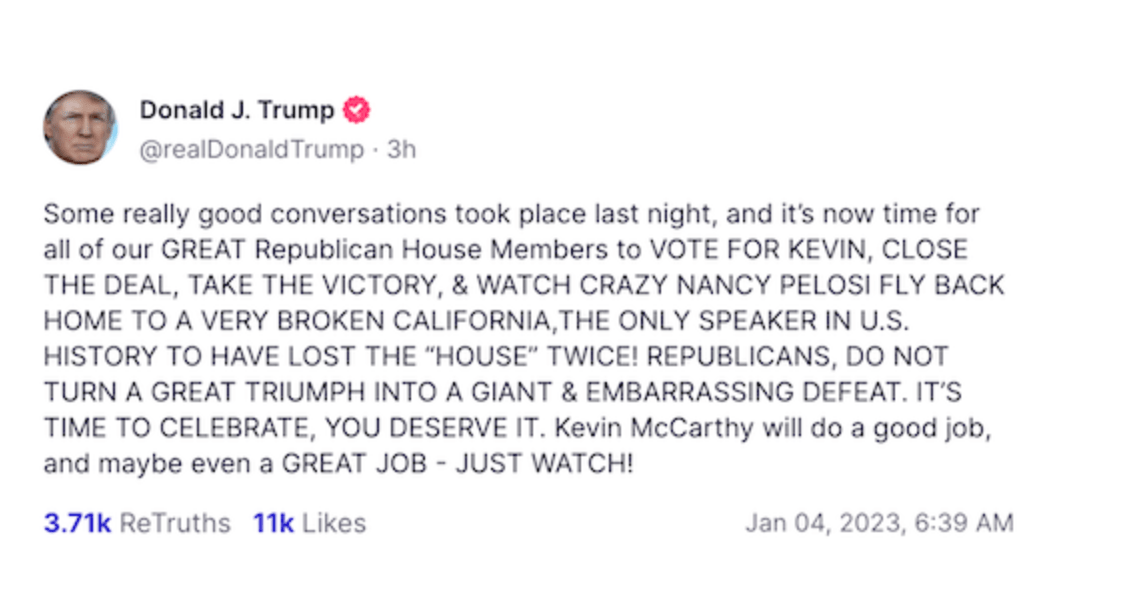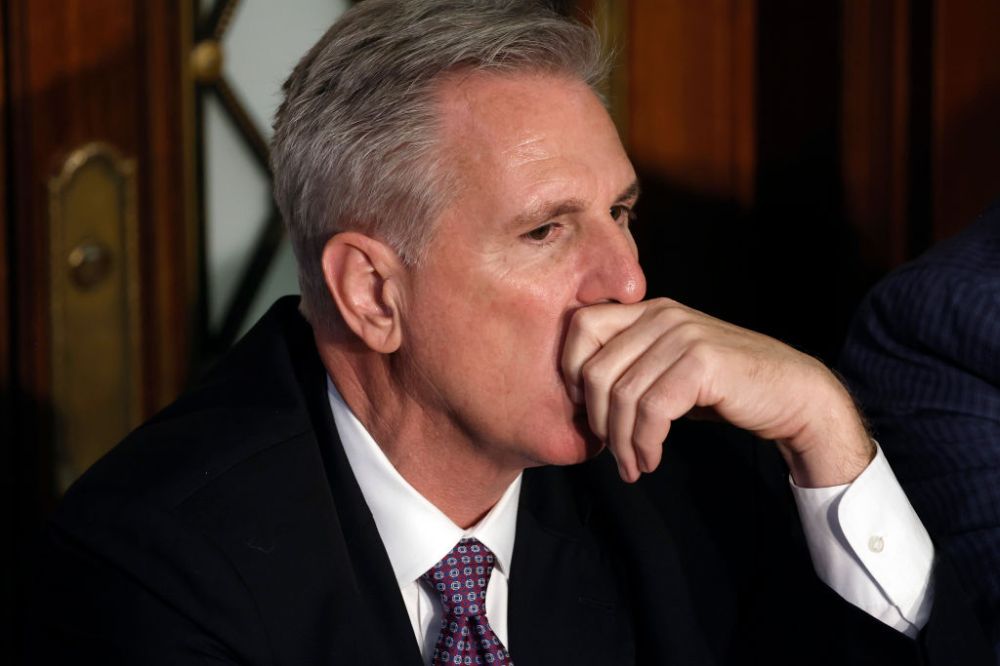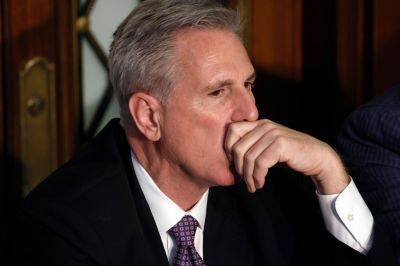As I write this on Wednesday afternoon, Kevin McCarthy’s fate is at once uncertain and entirely certain. It’s uncertain whether he’ll be elected speaker. It’s entirely certain that he’ll be a diminished, humiliated figure no matter the outcome.
I have complicated feelings about this.
Not very complicated. I relish his personal embarrassment for reasons explained here. No one in Congress save possibly Elise Stefanik has accommodated themselves to Trumpism in pursuit of power as cynically as McCarthy has. To watch him stymied and embarrassed repeatedly on the House floor by the Trump acolytes he courted at the brink of achieving his life’s ambition is justice too sweet for my weak prose to capture. We’d need a poet for the occasion.
Come to think of it, that poem has already been written.
If he can’t get to 218 and ends up withdrawing, I assume he’ll resign his seat. The ordeal of having to stand aside for one of his deputies and return to backbencher status would be too mortifying even for him to bear. (I think. McCarthy’s tolerance for humiliation is superhuman.) If he does get to 218 by meeting every demand of the MAGA holdouts in exchange for their support, he’ll be their prisoner so long as he holds the gavel. Already they’ve forced him to reduce the threshold to bring a motion to oust the speaker to a measly five votes. The first time he crosses them, the Gaetz/Biggs “Never Kevin” nucleus will have the numbers with Democratic help to fire him into the sun.
And McCarthy knows it. Which could be dangerous to the fiscal stability of this country.
Or maybe, in desperation, he’ll cut a deal with Democrats to earn their support, assuming they’re amenable. It’s anyone’s guess what that deal might look like—committee chairmanships for some Dems, maybe?—but I continue to believe backing McCarthy would be a shrewd move by the left to sow chaos on the right. Chances are they’ll end up with a Speaker Scalise or a Speaker Jordan if McCarthy continues to flail; they’re better off with a Republican speaker who’s beholden to them, knowing that he’ll be attacked by populist conservatives as a pawn of progressives for the rest of his cursed speakership.
Whatever happens, McCarthy is destined to quit or to end up under the thumb of some hostile faction to his left or right. Just deserts.
He isn’t the only one who stands to be diminished by this process, though. Another guy whose comeuppance is overdue has weighed in.

Trump had kept quiet lately about McCarthy, declining to endorse him when asked on Tuesday night. But he was all-in as of Wednesday morning, staking his credibility as the Great MAGA King on his ability to move the votes of the stubborn “Never Kevin” holdouts.
It didn’t work out for him. McCarthy lost another three floor votes on Wednesday after Trump’s endorsement. Figures like Matt Gaetz have evidently learned the lesson taught by Brian Kemp in Georgia that you can survive and thrive as a Republican if Trump is mad at you so long as you’re not mad at him. That’s especially so in this case since Trump is aligned with the establishment McCarthy wing while the “Never Kevins” represent the populist opposition.
“There is something of a cautionary tale in McCarthy surrendering so much of his dignity and credibility for an endorsement that has turned out not to be decisive,” Alex Burns noted presciently before the first three House votes for speaker ended in stalemate. If Trump can’t drag McCarthy over the finish line, it’ll prove that he’s lost clout following the great midterm disappointment even among his staunchest supporters in the House. The MAGA Frankenstein he built will have finally broken out of the lab.
And as it goes about wrecking the GOP’s governing credibility, it’s hard not to enjoy the consternation of those in the caucus who accommodated it for the sake of getting ahead in politics. On Tuesday an irascible Rep. Dan Crenshaw described the “Never Kevin” bloc as “enemies now.” Rep. Nancy Mace sneered at Gaetz for being a “political D-Lister.” Even Marjorie Taylor Greene marveled at how “destructionist” her comrades in the Freedom Caucus were being by opposing McCarthy.
What did they think was going to happen, wondered The Bulwark’s Tim Miller?
“McCarthy and Crenshaw and their ilk convinced themselves that they could throw in with the world’s biggest grifter, tell lie after lie (after lie) to their own voters, campaign for a boat of sh-thouse rats so crazy that they make yesterday’s crazies blush—and at the end be rewarded with their loyal support,” he marveled. Tuesday’s stalemate was the logical result of more than a decade of right-wing political culture that prioritized populist spite toward establishments of every stripe over governing effectively.
Perhaps—perhaps—this fiasco will convince Republicans inside and outside Washington that things have gone too far and it’s time for a correction, although if an attack on the Capitol wasn’t enough to teach them that, the lesson may be unteachable. But just as underperforming in the midterms weakened Trump’s grip on the GOP to a degree the insurrection never did, embarrassing the caucus on day one of the new term might prove a more potent “enough’s enough” moment than an attempted coup was. The only real sin in Republican politics anymore is hindering the party’s ability to consolidate power. The “Never Kevins” have committed it, which is why even prominent populists like Greene and Mark Levin are mad at them.
Schadenfreude isn’t the only reason to appreciate the roadblocking of McCarthy, however.
My boss Jonah Goldberg and National Review’s Dominic Pino each argue persuasively today that a little chaos that diminishes the speaker’s role is a good thing. Power in the House has been centralized to a perverse, civically unhealthy degree over the past decade. Returning to the messy business of regular order in which members hash out the details of bills among themselves, in committee, instead of rubber-stamping the latest edict from leadership would be good for America. Restoring the chamber as a place to legislate rather than grandstand might attract more legislators and fewer grandstanders to seek public office. “Congress is supposed to be where politics happens,” Jonah writes, succinctly. Because politics doesn’t happen there in any meaningful way anymore, it happens everywhere else.
Insofar as members of the “Never Kevin” bloc use their leverage to extract concessions on returning to old-fashioned sausage-making regular order, their obstruction will benefit the country. And it’s worth doing unpopular things that benefit the country, even if rank-and-file partisan Republicans dislike seeing the caucus squabble at a moment when the national media is chuckling about their dysfunction.
All in all, it’s a cut-and-dried case for sitting back and savoring the chaos in the House as it plays out.
But as I say, the emotions are mixed.
This is, after all, a power play by some of the most obnoxious populists in the caucus, and it’s likely to succeed. If you’re pleased to see the likes of Gaetz and Lauren Boebert demonstrate their willingness and ability to temporarily derail the federal government, and to enjoy themselves immensely while doing so, that makes one of us.
Were the “Never Kevin” bloc united behind a demand to return to regular order, their opposition would be worth cheering. But they aren’t. It’s not clear what concessions, if any, McCarthy could make to win their votes, in fact. The “ask” seems to change by the day.
Initially they wanted to strip power from the leadership of each caucus to file a motion to remove the speaker and return that power to individual members. McCarthy caved on that, as noted above, by allowing any five members to file such a motion. It wasn’t good enough; the “Never Kevins” want any single member to be able to do so. They’ve also asked for—in no particular order—a new Church Commission to investigate the Justice Department, IRS, and Anthony Fauci; votes on a number of bills, some of which (e.g., congressional term limits) may or may not be constitutional; a pledge by the top Republican PAC not to support challengers to populist incumbents; and, most recently, their own “legal entity” empowering them to file lawsuits, never mind that it’s unlikely such an entity would have standing in court to oppose the Biden administration.
In theory, McCarthy granting them all of that would be enough to win their support. In reality, Matt Glassman’s conclusion is inescapable.
They don’t want McCarthy, period, and will keep inventing new demands that he can’t satisfy to justify their opposition. Some might hold personal grudges against him. Some might believe he’s too unctuous an operator to be fit for office. Some might disdain big government so fervently that they consider it good for conservatism whenever Congress is paralyzed and looks incompetent to the public. And some, of course, might be in it strictly for the media attention and grassroots donations that come with being a populist rebel forever attacking the establishment Death Star. McCarthy is a pre-Trump Republican authority figure. For the “Never Kevins,” that may be reason enough to try to take him out.
But mainly I suspect they’re against McCarthy to show the leadership in the starkest possible way that populists will call the tune in the new Congress. That would be dispiriting under any circumstances but is especially dispiriting in light of the midterm results. As David Frum said:
Normally a faction that’s battered at the polls is chastened in the aftermath. My last column of 2022 described the optimism I felt after numerous “rigged election” cranks were repudiated (narrowly repudiated) on Election Day. It seemed like a possible inflection point away from the trollish base-pleasing grandstanding of the last 13 years and toward a somewhat more serious Republican Party. If the MAGA wing of the House GOP caucus had responded to the election by falling in line behind McCarthy, grudgingly or not, that would have been another sign that governing had taken precedence over populist antics. Instead the discouraging midterm results might have inspired them to want to send a message to the rest of the caucus this week that all who seek power will still need their approval to gain it.
The truth is that the populist wing isn’t really a “faction” of the Republican Party. It’s functionally a separate party and has been since before Trump entered politics, although the fact that he’s never had much interest in the Republican Party has doubtless helped shape his disciples’ perpetual insurgency. He didn’t actually build this Frankenstein, as I suggested earlier; he may have brought it fully to life but it was stitched together during the Tea Party era (if not earlier), waiting to be animated. If anyone built it, it was conservative media, where members of the anti-McCarthy bloc routinely appear.
And so the “Never Kevins” have no reason to compromise, owing nothing to the party or to its leadership. All but one of the 20 who voted against McCarthy on Tuesday represent districts that lean Republican by double digits. The one exception, Rep. Scott Perry, hails from a district that leans R+9. No one’s going to lose a primary in a ruby-red district for being too anti-establishment, too resolute in their fidelity to what John F. Harris calls “the organizing principle of contemporary conservatism: Contempt for any figure who doesn’t also share an attitude of contempt or express it with sufficient purity.”
Parties are capable of imposing discipline on their members. The Republican Party isn’t capable of imposing meaningful discipline on the “Never Kevins.” (The leader of the MAGA Party isn’t capable either, evidently.) They can fundraise lavishly online without institutional party support, they can speak directly to voters without institutional media support, and they can trust that the GOP leadership won’t dare penalize them for fear of inciting a populist backlash. If the leadership did penalize them, it would only burnish their anti-establishment credentials and risk making them more popular. They’re functionally independents. And because their voters will continue to pull the lever for them as the “craziest SOBs in the race,” they’re untouchable.
So much so that, according to Punchbowl News, Gaetz, Boebert and Perry warned McCarthy on Monday that they’re fine with Democrat Hakeem Jeffries being elected speaker on a plurality vote. Frankly, for a populist Republican who thrives on adversarialism, a Democratic speaker is preferable to a Republican one. Trump has certainly always seemed to relish defeating the “traitors” on the right who have crossed him more than he has Democrats, hasn’t he? Should the “Never Kevins” be different?
If you’re not worried about the fact that America’s fiscal stability may end up in the hands of 20 or so uncompromising populist de facto independents who answer only to constituencies hardened by decades of right-wing media’s “suckers and fighters” logic, you should be. On Tuesday Rep. Guy Reschenthaler, a McCarthy ally, was so exasperated by leadership’s inability to move the “Never Kevins” that he wondered if some harsh words from Ben Shapiro might do the trick. Imagine a top member of Congress feeling obliged to turn to a podcaster to try to discipline members of his caucus because he lacks the means to do so himself. That’s today’s GOP, two parties under one umbrella, neither with much of an agenda, each wishing it had more leverage over the other, frozen in mutual antagonism. Prior Republican House majorities were large enough that that reality could be papered over, more or less. Not this time.
In the years-long struggle for dominance over the American right, a significant chunk of the MAGA wing has decided that one bad election (or several bad elections, truly) isn’t reason enough to rethink its approach. That’s not worth celebrating, no matter how enjoyable McCarthy’s personal anguish might be.
Maybe there’s a happy ending, though. If annoyance among the right at “Never Kevin” obstructionism is broad enough, it might soften Republican opposition to bipartisanship.
There’s nothing inherently virtuous about bipartisanship. Some of the worst legislation is produced with the support of both parties. But in an era of partisan rancor, the country would profit civically from greater comity between its representatives. The speaker standoff may set the tone for the coming term: As of Wednesday afternoon, there are whispers of Democrats potentially compromising to help elect McCarthy in return for certain concessions about future shutdowns and raising the debt ceiling.
That sort of deal remains unlikely, as every House Republican who joins it will worry about their next primary. But some McCarthy supporters in the caucus may conclude that they’re more likely to govern effectively by partnering occasionally with Democrats on legislation than by trying to appease an implacable “Never Kevin” bloc that thrives on obstructing its political enemies, whether on the left or the center-right. “One of the striking aspects of our current politics is the growing disdain of some in the Republican universe for the whole idea that majorities get to govern,” Jeff Greenfield wrote on Wednesday. Most House Republicans were willing to indulge that disdain during the “Stop the Steal” travesty that almost caused a constitutional crisis. They may be less willing now that it’s their own governing majority that’s threatened by MAGA bulldozing.
Over the next two years the new House majority will stumble repeatedly into a battle of wills between the two right-wing parties to establish dominance. Mainstream House Republicans should want to be bold early to show that their wing, which has the numbers, won’t be cowed by hostage-taking. If that means doing a deal with Democrats on McCarthy to set the tone and taking some flak from the base as a result, they might be willing to pay that price. They have cover from Trump on this one, at least.
But if they don’t and McCarthy goes down in flames, that’s okay too. It would be the most morally satisfying result. And having the “Never Kevin” wing run wild for two years before it ends up tanking the country’s creditworthiness would, at the very least, teach Americans a hard lesson about gambling on rule by Republicans before the party’s been purged of its performance artists. The right can’t govern effectively as two parties. Something’s got to give.







Please note that we at The Dispatch hold ourselves, our work, and our commenters to a higher standard than other places on the internet. We welcome comments that foster genuine debate or discussion—including comments critical of us or our work—but responses that include ad hominem attacks on fellow Dispatch members or are intended to stoke fear and anger may be moderated.
With your membership, you only have the ability to comment on The Morning Dispatch articles. Consider upgrading to join the conversation everywhere.